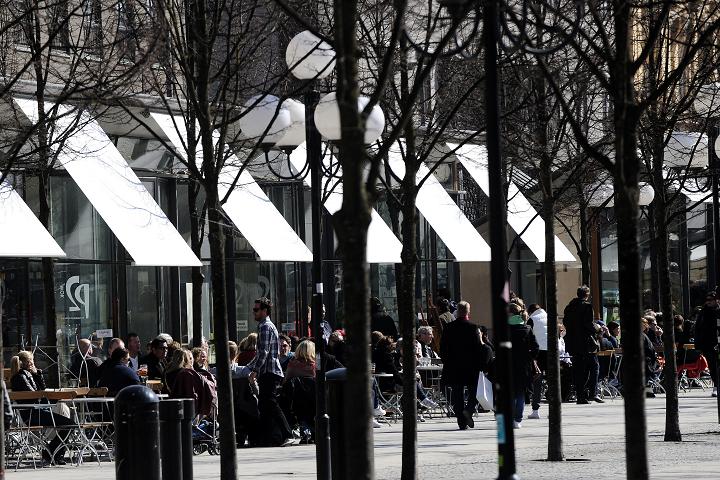Sweden: Flights and food cause major emissions

Swedish toxic emissions decreased in 2011 and 2012, but private consumption affecting emissions has increased over the last 20 years. Primarily when it comes to international flights and food consumption.
Radio Sweden hit the streets of Stockholm to ask people if they are aware of how their lifestyle choices affect the environment.
”Well, hot water has always been one, and all kinds of plastic objects, trying not to use them or it’s not good for my health and it’s not good for the Environment, for example,” Hillevi tells Radio Sweden.
How often do you travel abroad?
“Well… as often as I can. And I know that’s not a really good thing but I still do it because it broadens my mind, it gives me other things to thinka bout,” she says.
Hillevi is one of many Swedes, who are aware of their own carbon foot print, and modify their lifestyles accordingly, yet travel several times a year and eat out frequently. Another woman I spoke to said she had cut down on her travelling, but not on her eating habits.
“I actually cut down on my overseas travelling – because of the environment, yes. Because I travel so much between these two countries. I went to south Africa in 2010 and I decided that was my last long flight for a long time. I miss it, but it’s not good for the environment so I try to think about it,” Sussane tells Radio Sweden.
As restaurants throw away more food than most, eating out can be seen as a significant contribution to the emissions, something not everybody is aware of.
How often do you eat out?
“Too often! Almost everyday – not everyday but maybe five times a week,” says Sussane.
Private consumption has increased, which has affected the way we look at Sweden’s carbon emissions. Although reports have shown that Sweden’s domestic emissions decreased in 2011 and 2012, a new report from the Swedish Environmental Protection Agency show that emissions from other countries caused by Swedish consumer habits has increased by 50 % over the last 20 years. I met Hanna Brolinson at the Environmental Protection Agency, and asked her if harmful consumption habits like travelling abroad cancels out positive initatives like recycling and avoiding meat products.
“I can see your point, but no – all decreases are good, and all awareness is good so that’s not how we should look at it. But it’s true that travelling and international flights, they do really increase and emissions that are linked to this, they do increase and the trend is increasing, so this is a major problem I would say. And this is also a problem as this sector lacks, for example, taxes and other policies so as to decrease the volume of flights we need to have some steering policies,” she says.
Despite the fact that the Green Party is in government, and the fact that Sunday’s polling numbers had them up by more than 2 % – the highest they’ve been all year – increased taxes are not popular. The gasoline tax that the Greens managed to slip into the spring budget has been heavily criticized, and the price of eating out is already perceived as quite expensive, especially in big cities like Stockholm and Malmö. But Hanna Brolinson believes taxes are the key to curb harmful consumption.
“Yeah for example a national flight tax. That would increase the cost for the ticket, of course. And such taxes are introduced in other European countries so there are working policies in that area. There are also suggestions for more taxes on food, that would be steered toward a more sustainable consumption of food, but there are several suggestions,” says Brolinson.
Do you think this is realistic given the current political climate?
“I really do hope so, because especially to fight the increasing trend of emissions from travelling, which is a sector where we don’t see that there are any technical solutions that we could implement very soon. We need to fight the increase of numbers of passengers that do fly abroad, so I really do hope it will be possible to implement such a tax.”
Despite widespread awareness and possible tax implementations, many people simply have other things on their minds, and other worries in their lives, like Axel Axelsson, whom Radio Sweden met outside the Environmental Protection Agency.
Do you think about how your lifestyle affects the env?
“No”
Why not?
“It’s not really important, my life ain’t so bad”
How often do you travel?
“A couple of times a year”
How often do you eat out?
“Every lunch,” he says, chuckling.
Related stories from around the North:
Canada: Report warns more Arctic shipping will increase warming, affect health, Radio Canada International
Iceland: Acid Arctic Ocean and Russell Brand?, by Deutsche Welle’s Iceblogger
Norway: Emissions speeding up Arctic Ocean acidification, Alaska Dispatch
Russia: Arctic mega-polluter pays record high dividends, Barents Observer
Sweden: Business and environmentalists unite in Sweden, Radio Sweden
United States: NASA findings show no excessive methane emissions from Alaska, Alaska Dispatch News



